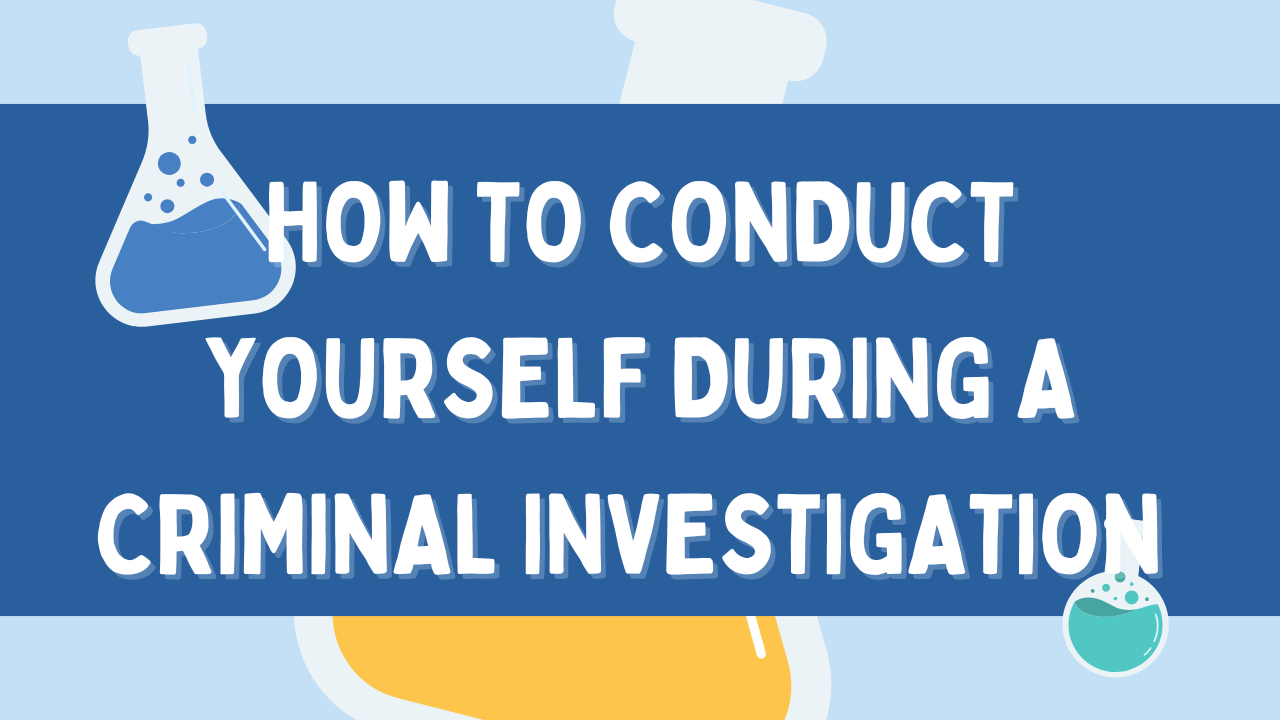How to Conduct Yourself During a Criminal Investigation: Being the subject of a criminal investigation can be a stressful and overwhelming experience. Whether you are innocent or have made a mistake, it is important to know how to behave during such an investigation. Your behavior can have a significant impact on the outcome of the case, your personal reputation and your future. In this article, we will provide you with important advice on how to handle a criminal investigation with composure to ensure your rights are protected and to avoid actions that could compromise your defense.
1. Stay calm and composed
When you realize that you are being investigated for a crime, your first reaction may be fear or panic. This is a natural reaction, but it is important to stay calm and composed. Panic can lead to impulsive decisions, such as saying or doing things that can harm your case.
Why it is important to stay calm:
- Think clearly: Panic clouds judgment. Staying calm allows you to think clearly and make rational decisions.
- Professional interactions: Police officers are trained to observe behavior. Fearful or defensive behavior can arouse suspicion, even if you are innocent.
- Better decisions: Emotional reactions can lead to hasty decisions, such as giving too much information or giving conflicting statements.
Take a deep breath, remember your rights, and try to approach the situation with composure.
2. Understand your legal rights
One of the most important steps to performing well in a criminal investigation is understanding your legal rights. Many people unknowingly give up their rights because they think cooperating will solve the problem quickly. However, this can sometimes lead to self-incrimination.
Important rights you need to know:
- Right to remain silent: The Fifth Amendment gives you the right not to incriminate yourself. You are not required to answer questions until you have legal representation.
- Right to counsel: The Sixth Amendment guarantees your right to counsel. If you cannot afford an attorney, one will be provided to you. It is important to have an attorney present at any interrogation or court proceeding.
- Right Against Unreasonable Searches: The Fourth Amendment protects you against unreasonable searches and seizures. Law enforcement must have a warrant to search your home, vehicle, or personal property unless you give your consent.
Always remember these rights and use them to protect yourself during an investigation.
3. Avoid Voluntary Disclosure of Information
Many people believe that fully cooperating with law enforcement will dispel them. While it is important to be polite and respectful, intentionally giving out too much information can hurt your case.
Why You Should Be Careful With Information:
- Misinterpretation: Even harmless statements can be misunderstood or taken out of context, leading investigators to believe you were involved in the crime.
- Contradictory Statements: Without legal advice, you may inadvertently make contradictory statements. Investigators could use these contradictions against you.
- Emotional Pressure: During your interrogation, police officers may use tactics to pressure you into confessing or providing information. Saying less can help you avoid falling into these traps.
Instead of volunteering information, don’t hesitate to say that you would like to speak to a lawyer before answering questions. This will not make you appear guilty, but it will show that you know your rights and are legally protecting yourself.
4. Hire an Experienced Criminal Defense Attorney
One of the first steps you should take in a criminal investigation is to hire a qualified criminal defense attorney. Even if you believe you are innocent or the case is minor, legal representation is essential.
The benefits of hiring a lawyer:
- Legal knowledge: A criminal defense lawyer knows the intricacies of the law and can advise you on how to respond to the investigation.
- Communication with authorities: Your lawyer can handle communications with law enforcement on your behalf, ensuring that your rights are protected and that you do not accidentally say something incriminating.
- Investigation strategy: Lawyers can help you gather evidence and develop a strategy for your defense, whether you are innocent or guilty.
- Court representation: If the case escalates to formal charges, hiring a lawyer early will ensure that you are adequately represented in court.
Hiring a lawyer early in the investigation can often prevent further escalation or at least help you avoid potential legal pitfalls.
5. Don’t tamper with evidence
Once you become aware of a criminal investigation, it can be tempting to hide or destroy evidence, especially if you’re worried it could be used against you. This is a serious mistake that can have serious consequences.
The consequences of tampering with evidence:
- Obstruction of justice: Destroying, altering, or hiding evidence is considered obstruction of justice and is a serious crime in itself that can add additional charges to your record.
- Heightened suspicion: Law enforcement is trained to recognize signs of evidence tampering. Even if the evidence is unrelated to the crime, the tampering can increase suspicion and lead to further investigation.
- Harder penalties: If you are found to have tampered with evidence, it can lead to harsher penalties at sentencing.
The best solution is to leave all evidence as it is and consult with your attorney on how to properly handle it.
6. Be mindful of your actions and words
Your behavior and communication during a criminal investigation will be scrutinized both in person and online. Everything you say and do can potentially be used as evidence, so it is important that you be mindful of your actions.
Social media and communications:
- Avoid discussing the case: Do not talk about the investigation on social media or with friends. These statements can be used against you later, even if they seem casual or harmless.
- Monitor your online activity: Investigators can look at your social media profiles, email communications, and other online behavior. Be careful about what you post and avoid deleting past posts, as this could be viewed as tampering.
- Limit conversations about the case: Do not discuss details of the case with anyone other than your attorney, including family members. Misunderstandings or rumors may spread, complicating the investigation.
7. Cooperate within the limits of the law
While you should protect your rights and avoid oversharing, it is also important to cooperate with the investigation within the limits of the law. Behaving respectfully and complying with legal requests can work to your advantage and show that you are not trying to hinder the investigation.
How to cooperate effectively:
- Provide basic information: You can provide your name, identification, and other basic information without discussing the matter itself.
- Comply with legal orders: If you receive a legal order, such as a subpoena or search warrant, comply respectfully, but document everything and contact your attorney for further advice.
- Attend mandatory meetings or hearings: If you are asked to appear in court or attend meetings with investigators, appear as required, but always with legal counsel.
Conclusion
Managing a criminal investigation requires a delicate balance between protecting your rights and cooperating within legal boundaries. By staying calm, understanding your rights, hiring an attorney, and being mindful of your words and actions, you can improve your chances of a positive outcome. Above all, do not try to handle the situation alone: seek legal advice and follow its advice to ensure that you behave appropriately during the investigation.



